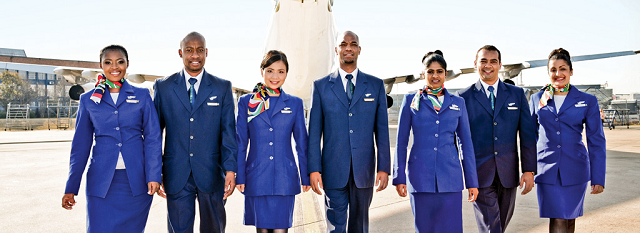A Guide to Flight Attendant Jobs in South Africa. Dreaming of a career jet-setting across South Africa’s breathtaking landscapes? This comprehensive guide unveils everything you need to know about becoming a flight attendant in the vibrant aviation scene, from training and qualifications to salary expectations and top airlines. Buckle up for your journey to the skies!
Ever dreamt of trading office walls for panoramic cloudscapes? Do you thrive in dynamic environments and love connecting with people from all corners of the globe? Then being a flight attendant in South Africa might just be your calling! This vibrant nation boasts a booming aviation industry with airlines constantly seeking passionate individuals to join their cabin crew.
RELATED: How To Become a Flight Attendant in South Africa
This comprehensive guide will equip you with everything you need to know about flight attendant jobs in South Africa, from airlines and training requirements to salary expectations and practical tips to land your dream role. So, fasten your seatbelts, and let’s take flight!

Picture yourself soaring above the dramatic cliffs of Cape Town, navigating the golden plains of Kruger National Park, or witnessing the shimmering coastline of Durban from your window seat. Now, imagine being the one ensuring the comfort and safety of passengers on these breathtaking journeys. This is the reality of a flight attendant in South Africa, a career that combines adventure, service, and the thrill of the open sky.
Why Choose South Africa?
South Africa’s aviation industry is booming, with major airlines like South African Airways, FlySafair, and Kulula offering exciting opportunities for aspiring flight attendants. Beyond the career prospects, the country itself beckons with its diverse landscapes, vibrant culture, and friendly people. Imagine exploring bustling Johannesburg, savoring the winelands of Stellenbosch, or diving into the vibrant coral reefs of Durban – all as part of your job!
Qualifications and Training on A Guide to Flight Attendant Jobs in South Africa:
To become a flight attendant in South Africa, you’ll need to meet specific requirements. These typically include:
- Matriculation (Grade 12) or equivalent
- South African citizenship or permanent residency
- Fluency in English (Afrikaans is often an advantage)
- Excellent communication and interpersonal skills
- Height and weight requirements (varies by airline)
READ ALSO: A Comprehensive Guide to Part-Time Jobs for International Students in Australia.
Several accredited training schools offer comprehensive programs that equip you with the necessary skills, including safety and emergency procedures, first aid, customer service, and onboard etiquette.
The Flight Attendant Life:
A typical day for a flight attendant involves:
- Pre-flight preparations, including safety checks and passenger briefing
- Ensuring passenger comfort and adherence to safety regulations during the flight
- Providing exceptional customer service and addressing passenger needs
- Maintaining a calm and professional demeanor in challenging situations
While the schedule can be demanding, with early mornings, layovers, and long flights, the rewards are equally significant. You’ll build lifelong friendships with colleagues, experience diverse cultures, and witness breathtaking landscapes from a unique vantage point.
Salary and Benefits:
Flight attendants in South Africa enjoy competitive salaries and benefits packages, typically including:
- Base salary with additional allowances for overtime and layovers
- Comprehensive medical insurance
- Paid leave and vacation time
- Discounted travel opportunities for themselves and family members
Top Airlines to Consider:
South Africa boasts several renowned airlines offering excellent career paths for flight attendants. Some of the top choices include:
- South African Airways (SAA): The national carrier, known for its extensive network and commitment to service excellence.
- FlySafair: A leading low-cost airline offering a dynamic and fast-paced environment.
- Kulula: Another popular low-cost carrier with a focus on fun and affordability.
- Mango Airlines: A subsidiary of SAA, offering regional flights and a strong focus on customer service.
Conclusion:
So, if you’re passionate about travel, service, and adventure, a career as a flight attendant in South Africa could be your perfect flight path. With the right qualifications, training, and a positive attitude, you can soar above the clouds and embark on a rewarding journey that takes you across the Rainbow Nation and beyond. Remember, the skies are waiting for you!
Frequently Asked Questions:
How much does a Flight attendant make in South Africa?
The average flight attendant salary in South Africa is R 198 000 per year or R 102 per hour. Entry-level positions start at R 178 200 per year, while most experienced workers make up to R 405 155 per year.
What qualifications do you need as a flight attendant?
Flight attendants receive training from their employers and must be certified by the Federal Aviation Administration (FAA). Flight attendants typically need a high school diploma or the equivalent and work experience in customer service.
Which airline has the highest-paid flight attendants in South Africa?
The airline that has the highest-paid flight attendants in South Africa is South African Airways International. They pay their flight attendants ZAR 25,216 per month.
How long is a flight attendant course in South Africa?
This 8-week course will ensure that you stand apart in this industry and be the best in your field.
Is it hard to get a flight attendant job in South Africa?
Competition is stiff for flight attendant jobs in South Africa. Although there are no guarantees of employment, aspiring flight attendants may find it advantageous to complete a flight crew training program approved by the South Africa Civil Aviation Authority.





